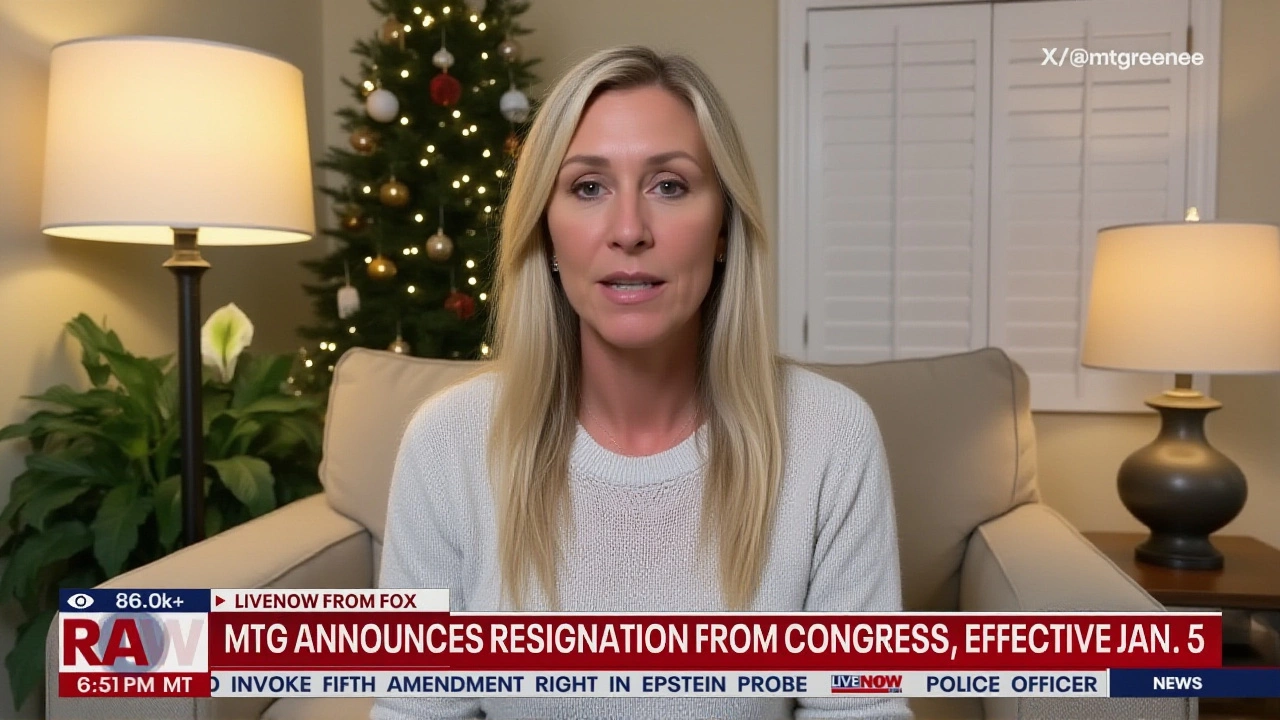When Marjorie Taylor Greene announced she was stepping down from Congress, it wasn’t just another resignation—it was the collapse of one of the most volatile alliances in modern American politics. The Georgia Republican, 50, revealed on Friday, November 21, 2025, that she would leave the United States House of Representatives effective January 5, 2026, ending a turbulent five-year tenure representing Georgia’s 14th Congressional District. The announcement, delivered via a four-page written statement and a 10-minute video posted on X, came just days after Donald J. Trump, the 45th president and 2024 Republican nominee, publicly withdrew his endorsement. The rupture wasn’t subtle. It was personal. And it’s reshaping the GOP’s fragile majority.
A Rift Over Epstein and Power
Greene’s break with Trump didn’t happen over policy disagreements in the abstract. It exploded over the Jeffrey Epstein investigation. She accused his administration of burying evidence and protecting powerful men who exploited young women—a claim Trump dismissed as "unfounded" in private conversations with allies, according to ABC News. But Greene didn’t back down. In her resignation statement, she wrote: "Standing up for American women who were raped at 14, trafficked and used by rich powerful men, should not result in me being called a traitor and threatened by the President of the United States, whom I fought for."
Trump, in a brief phone interview with ABC’s Rachel Scott, responded with chilling brevity: "It’s great news for the country." He added he had no plans to speak with her—and didn’t know she was resigning until it was announced. That lack of forewarning, sources say, infuriated him. He had already begun funneling millions into potential primary challengers, believing Greene had become a liability. "She didn’t give me a heads-up," Trump told NBC’s Julie Tsirkin on November 23. "She couldn’t have won her primary after I threatened to fund a challenger."
The Political Fallout
Greene’s exit slashes the Republican majority in the House from 218-215 to a razor-thin 217-215, assuming no other changes. That’s one vote from a tie—and one vote from paralysis. House Speaker Mike Johnson, the Louisiana Republican leading the chamber, now faces an uphill battle pushing any legislation, from funding bills to immigration reforms. His leadership, already under pressure from hardliners, is now exposed to internal revolt. "This isn’t just about one seat," said Martha Zoller, a political analyst cited by Fox 5 Atlanta. "It’s about whether Trump still controls the GOP’s base—or whether the base is starting to outgrow him."
Greene didn’t just resign. She issued a manifesto. "If I’m cast aside by the MAGA movement," she wrote, "then many common Americans have been cast aside and replaced as well." She framed her departure not as defeat, but as martyrdom—a signal to voters that Washington’s machine crushes even its most loyal foot soldiers. She left the door open for a future return: "When the People realize they hold the real power… then I’ll be here by their side to rebuild it."

Who’s Next? A Competitive Battle Looms
With Greene’s seat vacant as early as January 2026, Georgia Governor Brian Phillip Kemp will call a special election. Already, Shawn Harris, a retired U.S. Army Major General with 34 years of service, has launched his campaign. Harris, a Democrat, is positioning himself as a steady, patriotic alternative to Greene’s fiery rhetoric. "This district doesn’t need chaos," Harris told Fox 5 Atlanta. "It needs someone who’s served, not someone who’s sensationalized."
But don’t count out Republicans. Several state legislators and local officials are reportedly weighing runs, including a former state senator from Rome and a conservative radio host from Dalton. The primary could become a proxy war between Trump loyalists and those trying to move the party beyond his orbit. "This isn’t just a race to replace Greene," said one GOP strategist familiar with internal discussions. "It’s a referendum on whether Trump’s brand of politics still wins in Georgia’s rural districts."
What This Means for the MAGA Movement
The real story here isn’t Greene’s resignation. It’s the unraveling of her alliance with Trump. For years, she was his most vocal congressional enforcer—attacking moderates, defending conspiracy theories, and dominating cable news. She helped him dominate the 2022 midterms. Now, he’s turned on her. Why? Because she crossed a line he didn’t want crossed: challenging his control over the narrative.
Trump’s move signals a dangerous shift: even his most loyal allies aren’t safe if they become too independent. It’s a warning to other MAGA figures: toe the line, or get replaced. But it’s also a gamble. Greene’s base—many of them women who see her as a voice against elite corruption—may not forgive Trump for turning on her. "She spoke for people who feel unheard," said a voter in Rome, Georgia, who asked not to be named. "Now Trump’s telling us we’re not worth fighting for. That’s not leadership. That’s betrayal."
And here’s the twist: Greene’s resignation might energize Democrats more than it helps Republicans. Harris isn’t just a candidate—he’s a symbol. A decorated veteran running against a figure who once claimed to be "the only one who speaks for the real America." That contrast is too sharp to ignore.

What’s Next?
By late December, Governor Kemp is expected to set the special election date. Early voting could begin as soon as February, with the general election in April. Meanwhile, Trump is likely to ramp up fundraising, targeting Greene’s district with ads attacking Harris and promoting his preferred Republican candidate. Greene, for her part, says she’ll remain active in conservative circles but won’t seek office in 2026. "I’m done playing their game," she told her followers in the video. "Now I’m going to help build a new one."
The 119th Congress won’t be the same without her. And neither will the GOP.
Frequently Asked Questions
Why did Marjorie Taylor Greene resign after being one of Trump’s biggest allies?
Greene resigned after Trump withdrew his endorsement following her public criticism of his administration’s handling of the Jeffrey Epstein investigation and other policies. She accused him of silencing women who were victims of powerful men, calling the backlash a personal betrayal. Trump responded by funding potential primary challengers, making her re-election unlikely.
How will Greene’s resignation affect the House Republican majority?
Greene’s departure reduces the Republican majority to 217-215, the narrowest possible margin without a tie. This makes passing legislation far more difficult for Speaker Mike Johnson, as even one defection could stall votes on budgets, immigration, or aid packages. The GOP now has zero room for error.
Who is running to replace Marjorie Taylor Greene?
Democrat Shawn Harris, a retired U.S. Army Major General with 34 years of service, has officially launched his campaign. Several Republicans are also considering runs, including local officials and Trump-aligned figures. The special election will likely be highly competitive, with national GOP money pouring in to shape the outcome.
What does this mean for the MAGA movement?
Trump’s betrayal of Greene signals that even his most loyal allies aren’t immune if they challenge his authority. But it also risks alienating grassroots supporters who see Greene as a voice for ordinary Americans. The movement may fracture between those who demand absolute loyalty and those who want more policy substance than personality-driven politics.
Will Marjorie Taylor Greene return to politics?
Greene has not ruled out a future return to elected office, but she has stated she won’t run in 2026. She framed her resignation as a step away from Washington’s machine, vowing to help rebuild political power from the grassroots. Many analysts believe she could launch a Senate bid in 2028 or run for Georgia governor if she rebuilds her base outside Congress.
How unusual is it for a sitting representative to resign after a falling out with their party’s leader?
It’s rare for a sitting member of Congress to resign over a personal feud with their party’s leader, especially when they’re part of the majority. The closest modern parallel is Rep. Trent Franks’ 2017 resignation over a scandal, but Greene’s case is unique: she’s leaving because her patron turned against her—not because of misconduct. It reflects the unprecedented personalization of power in today’s GOP.



